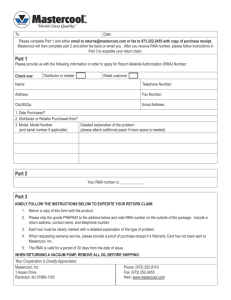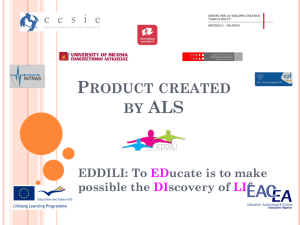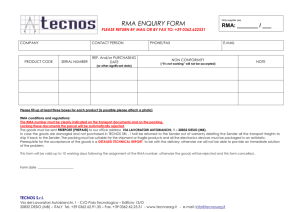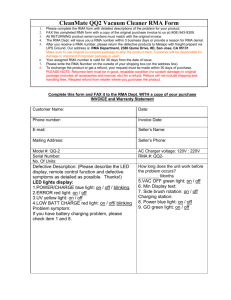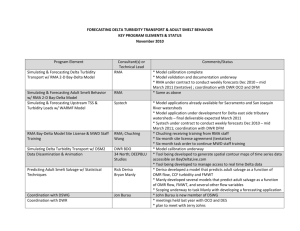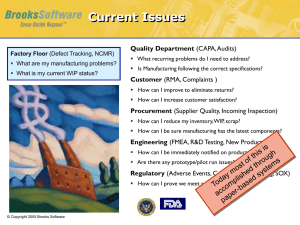The Reciprocal Maieutic Approach
advertisement
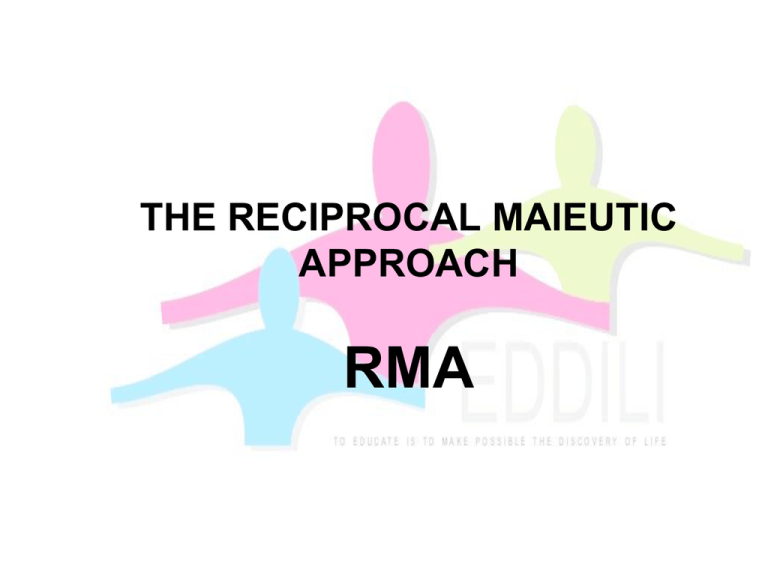
THE RECIPROCAL MAIEUTIC APPROACH RMA “If the eye does not strain, it doesn’t see. Skin that does not touch, doesn’t taste. If we do not imagine, we die.” (Danilo Dolci) Danilo Dolci (June 28, 1924 – December 30, 1997) was an Italian social activists, sociologist, popular educaor and poet. He is best known for his opposition against poverty, social exclusion and the mafia in Socily and is considered to be one of the protagonists of the nonviolence movement in Italy. Research concerning education, poetic creativity and reciprocal maieutics workshops have been key factors in Danilo Dolci’s work. “Do not contemplate without action, do not act without contemplation” (Giordano Bruno). THEORETICAL FRAMEWORK AND EXPERIMENTATION OF RMA RMA was developed from the Socratic concept "μαιευτικός", midwife: every act of educating is a giving birth to the full potential of the learner. Danilo Dolci’s concept of maieutics comes from experience, so a reciprocal relationship is necessary. Starting from this, there have been more contributions from other great thinkers and people in action (Capitini, Chomsky, Freire, Galtung, Gandhi, Habermas, Morin, Montessori, etc.) The Reciprocal Maieutic Approach (RMA) is a dialectic method of inquiry and "popular self-analysis" for empowerment of communities and individuals and it can be defined as a “process of collective exploration that takes, as a departure point, the experience and the intuition of individuals” (Dolci, 1996). It is the reciprocal maieutic communication that brings out people’s knowledge, with all participants learning from each other. . Assumptions - Dialogue as a tool for reciprocal research and active participation. - Each person has an inner knowledge that comes from experience. - Knowledge is dynamic and in constant evolution and it should be built within a group. - Everybody being in connection inside a group can be an element of change. The context • Maximum number of participants suggested is 20, minimum 10. • There is only one RMA coordinator for each session. • Maximum duration suggested is 3 hours. • The space is organized in order to create a democratic, non hierarchical environment. • Participants sit in a circle (sharing of power, equality), so everyone has the same distance from the centre and can look each other in the eyes. The space is the metaphor of relations, communication, expression and creativity. There isn’t any leader, boss, desk or pulpit. It’s useful to have a flipchart or a notebook to write down the diverse interventions and to record the outcomes of the session. Warm, bright and comfortable environment. A close connection with nature is very helpful. If possible, it is important to enable a coexistence between simple people, experts and professionals within the group. . Preparation to the RMA workshop - It is advisable for everyone to make a priori preparation (by reading documents, researching, bringing articles, lyrics, pictures etc.). - The subject matter that participants discuss is decided before the session, as it is necessary that everybody agree on the theme. The RMA workshop In the first meeting, it’s important that participants introduce themselves in a personal way or by presenting their personal dream. The RMA coordinator introduces the issue or a “good question”. Ex. What is peace according to your personal experience? What is war? The workshop should begin as a process of dialectical inquiry that should be easy and based on a democratic open structure, It’s not necessary to previously present the RMA theoretical framework. The RMA coordinator harmonizes the group discussion in order to allow each participant to have the proper amount of time during each session, so that each one can express her/himself on the issue and according to her/his own style and personality. It is important to always put emphasis on real needs, interests, desires and dreams first.. The coordinator should give the group the right rhythm in order to give space to reciprocal confrontation and to shape a new action-idea. During the session, participants ask when they want to speak, creating an order that should be It is important that everybody listens actively to each other’s voice. The coordinator might also invite to speak those participants who are silent, giving them the possibility to accept or refuse the invitation. However, it is up to the RMA coordinator to allow and even inspire moments of silence where people are not pressed to give necessarily some kind of answer, but rather to silently reflect on what they have just heard from other people and then talk. The RMA coordinator might intervene and give his own contribution in order to enable true reciprocity. It is important during the discussion that the RMA coordinator records what the participants say. After a certain number of meetings where participants will deeply experience RMA, the RMA coordinator could change during the workshop. Little by little, everybody should become a real mid-wife to everybody else. During the workshop all the participants discuss about how the learning experience is going and the discoveries made by the group. How to finish the RMA workshop? At the end of the workshop the RMA coordinator closes by asking a short evaluation to all participants about their personal experience and about what they have learnt within the group. The RMA coordinator closes the workshop by making a short summary of what has been said during the session and drawing conclusions on what emerged from it. The RMA coordinator should also talk about the next encounter and propose: when, at which time, about what. Characteristics of the RMA coordinator Capacity to coordinate the group process and at the same time to be at participants level (capacity to share power), to assure attention to feelings, individual/group plans and goals, to manage time. Capacity to ask questions and analyse problems instead of imposing solutions. Capacity to “read” and get through the group, empathy, capacity to valorise each individual experience and the expression of all participants. Communication skills, active listening. Capacity of summarizing and using key words, ability to reflect personal and group intuitions and ideas, rephrasing, initiate others to speak, clarify interventions. Capacity to manage conflicts inside the group and to transcend them in a positive way. Open to diversity, capacity to avoid and/or change prejudices, sensitiveness, patience. Creativity. THE RMA PROCESS The RMA learning process starts with a long-term process of analysis and discussion about meaningful themes for the group, getting deep into feelings, inner perspectives and needs that people have. In fact the starting point of a RMA workshop can be simply just a word or two. Gradually each of these initial words are associated to an adjective, an idea , a point of view and so this is how the actual workshop activity begins. The ultimate goal is not to understand some “true meaning”, but rather to reconstruct them through an shared experiential process of reciprocal discovery and respect. The RMA as a tool for social transformation What is the difference between transmission and communication? Transmission is continuously unidirectional, violent and outrageous. Communication is a bidirectional process, with neither active nor passive role, or a higher and a lower issuer. To communicate is to inform each other, to exchange, to growth reciprocally. • What is the difference between power and domination? Domination brings to violent society. It is violent, insane and doesn’t bring any development. Power means potentiality, strength, virtue, faculty to operate, aptitude to influence situations. We consider power what strengthens and emancipates everyone and develops democratic participation. When personal power pretends to dominate others, it becomes domination, it is as a “disease for power” and it only transmits in a unidirectional way, not recognizing the majority’s right to realize its own desire to communicate. Not being able to express ourselves (and to communicate) and not being able to use our power, sickens and kills us. THE REASONS FOR MAIEUTICS NOWADAYS The RMA workshop becomes the moment: to confront one another in order to propose and formulate projects, even if they seem utopian. to valorise the intimate and unexplored creative resources of every single person. > to give the chance to express oneself and listen, in order to look into deeper concepts and go beyond the surface. > to learn how to interact, how to smile, how to open necessary conditions where each creature can participate at a common project of growth. LEARNING OUTCOMES • As such, we think that RMA provides some key competences for at least two crucial aspects of life (especially in adult education): 1. Personal fulfillment and development throughout life (cultural capital): to able to pursue individual objectives in life, driven by personal interests, aspirations and the desire to continue learning throughout life 2. Active citizenship and inclusion (social capital): to able to participate as an active citizen in society • As for the measurement of the mastery of these particular competences, we are well aware that in fact they belong to a kind of transversal and generic competences that are most complicated to measure. LEARNING OUTCOMES Furthermore, we think that RMA provides valuable competence in the domain of interpersonal, cultural and social competence : - to be able to “participate in an efficient, constructive way and resolve conflict in social life, in interaction with other individuals (or groups) in personal, family and public context”. To build/transform relations; to solve and transcend conflict in a positive way. - Gives space to confrontation, to emotions to come out and be expressed. - Permits participants to communicate and so to clarify perspectives, to listen and to understand the self and other, to share different points, to work in a group. - increase of self-esteem, self-awareness, empowerment - Strengthen democratic attitudes and competences RMA as inter-cultural encounter The RMA can be considered as an extremely communicative methodology. RMA encourages a productive exchange among individuals and cultures in a non-violent, dialectical and creative way. Therefore RMA is a powerful tool to give a new structure to human relations, in order to reeducate people to authentic communication among all cultures. Bibliography: Comunicare, legge della vita, Danilo Dolci, 1993 Dal trasmettere al comunicare, Danilo Dolci, 1988 Conversazioni a Spine Sante, Danilo Dolci, 1962 The world is only one creature, Danilo Dolci, 1984 Una rivoluzione nonviolenta, Giuseppe Barone, 1999 Cosa è la maieutica, Sebastiano Pennisi, 2008 Verso una maieutica planetaria, Tiziana Morgante, 2007 Any questions?
